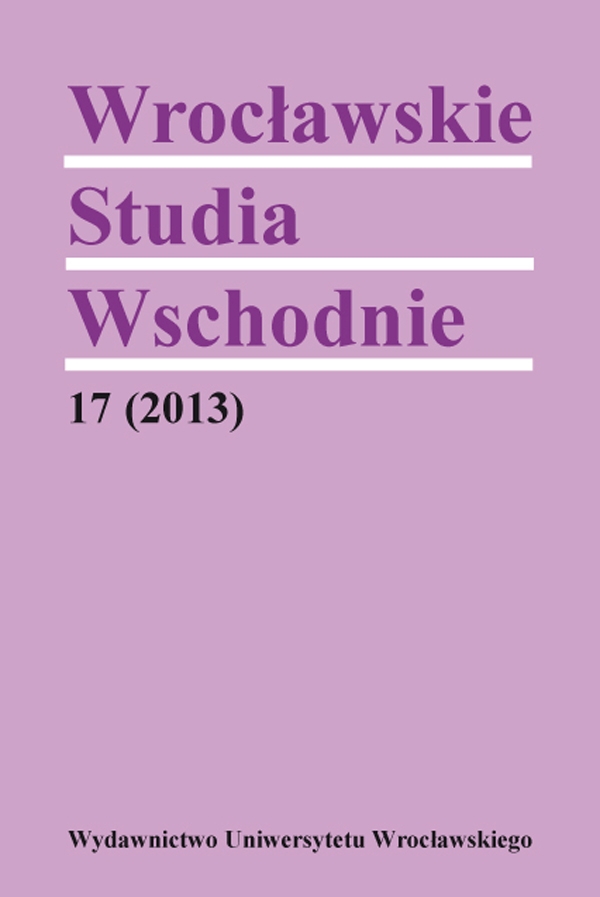

Artykuły

Поляки в Петербургском университете перед Польским восстанием 1863
Продолжавшийся несколько лет период после смерти Николая I, именуемый „послесевастопольской весной”, был существенным переломом в истории России XIX века. Начавшаяся тогда эпоха реформ охватила всю внутреннюю жизнь Империи, была также ощутима в Царстве Польском. Политическое оживление заметно было в университетских кругах, среди которых на первое место выдвинулся Петербургский университет. Одинамике изменений в этом ведомстве лучше всего свидетельствует факт, что в течение одного десятилетия были заменены три министра. Столичный университет оказался, рядом с московским и киевским, одним из крупнейших центров польских студентов в Империи. Польские университетские круги в столице России тесно сотрудничали скиевскими и московскими. Поляки оказывали активную поддержку действиям своих российских коллег, но одновременно подчеркивали свои собственные цели. Этому споскиевскими и московскими. Поляки оказывали активную поддержку действиям своих собствовала обстановка в Царстве Польском, где были уже предприняты действия по подготовке к вооруженному восстанию. Польские студенты в российских университетах создавали отдельные организации, именуемые „ogóły” общества и проводили самостоятельную, независимую от русских деятельность. Российские студенты требовали вернуть университетам автономию, а польские, рядом с этим, занимались патриотической деятельностью.
Студенческое оживление достигло апогея в 1861 году. По мнению просветительных властей и полиции, именно поляки были тем „злым духом”, сеющим фермент вуниверситетах. Из материалов полиции следует, что у польских студентов была собственная библиотека, в которой находились, в частности, запрещенные цензурой книги. Своеобразной политической демонстрацией польских студентов в Петербурге был заказ на заупокойную мессу в церкви Св. Екатерины об убитых в Варшаве демонстрантах. Присутствовали на ней как поляки, так и русские. Разногласия в польских студенческих кругах вызвало участие части поляков в похоронах Тараса Шевченко. Представители столичных польских студенческих кругов участвовали в сентябрьском съезде в Варшаве в 1861 году. Интересным и таинственным лицом в варшавских молодежных кругах был Владислав Кржижановски — выпускник Петербургского университета, который вмарте 1861 года был арестован, а в июле 1862 сослан в Сибирь. Внимания заслуживает агитационно-пропагандистская акция польских студентов. Подходящим моментом для ее проведения стали выезды на религиозные праздники и каникулы. Польские студенты приняли активное участие в студенческих беспорядках осенью 1861 года. Некоторые из них были даже арестованы и заключены в Петропавловскую крепость. После закрытия столичного университета часть поляков сдавали окончательные экзамены в ускоренном режиме, остальные уехали в родные стороны, чтобы включиться в конспиративную работу в Царстве Польском и в Литве.
Перевел Ежи Россеник
Poles at the University of Petersburg before the January Uprising
The period of several years after the death of Nicholas I, called “post-Sevastopol spring”, constituted an important turning point in the history of 19th century Russia. The reforms started at the time encompassed all aspects of life in the Empire and were also felt in the Kingdom of Poland. Political agitation could be noticed in academia, in which the University of Petersburg came to the fore. That the changes in this branch were very dynamic is best evidenced by the fact that over one decade there were no fewer than three ministers. The university in the capital city had, alongside the Universities of Moscow and Kiev, one of the biggest populations of Polish students in the Empire. Polish students in the Russian capital closely collaborated with their compatriots and fellow students in Kiev and Moscow. They actively supported their Russian colleagues, but at the same time stressed their separate national goals. This was facilitated by the situation in the Kingdom of Poland, especially in Warsaw, where preparations had already been under way for a future armed rising. Polish students at Russian universities formed separate organisations the so-called student bodies and pursued their own activity independently of the Russians. While the Russian students demanded a restoration of autonomy to universities, their Polish colleagues had patriotic objectives in mind as well.
The student agitation reached its peak in 1861. In the opinion of the educational authorities and the police, Poles were the “evil spirit” causing unrest at universities. The material gathered by the police suggested that the Polish students had their own library which housed books banned by the censors. The Polish students in Petersburg decided on a political demonstration when they ordered a mass to be celebrated at the Church of St. Catherine in memory of demonstrators killed in Warsaw. Those present at the mass included both Poles and Russians. Some controversy among Polish students was caused by the participation of some Poles in Taras Sevchenko’s funeral. Representatives of Polish students from the capital took part in the January 1861 convention in Warsaw. An interesting and mysterious figure in the Polish student circles in Warsaw was Władysław Krzyżanowski — a graduate of the University of Petersburg, who in March 1861 was arrested and in July 1862 exiled to Siberia. Worthy of note is a propaganda campaign conducted by the Polish students. A good opportunity for it was provided by religious feasts and summer holidays. Polish students took an active part in student protests in the autumn of 1861. Some of them were even arrested and imprisoned in the Peter and Paul Fortress. After the closure of the university in the capital, some Poles quickly sat their final exams, while others went to their homeland in order to become involved in clandestine activ-ities in the Kingdom of Poland and in Lithuania.
Translated by Anna Kijak